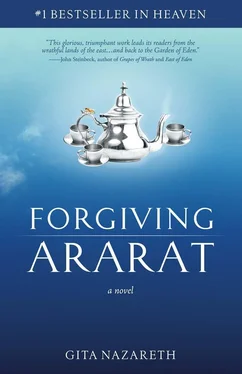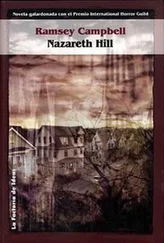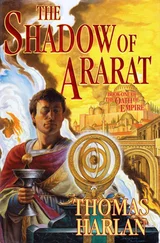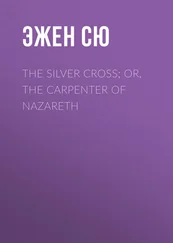The express bus gathered speed and the buildings of Haifa flashed by. In the middle of the journey, in the middle of a street, the overdressed man stood calmly, braced himself against a support pole for standing passengers, and from beneath his long coat pulled an automatic assault rifle. Without uttering a word, he opened fire on the passengers, sweeping the bus in an arc. Brass shell casings rained down, and a fine spray of blood filled the air as bodies collapsed onto the floor, including the elderly couple, the secretary, the businessmen, the high school students, and the young mother cradling her infant son. Elon Kaluzhsky, who had been thinking about dates and their meaning, was an athletic man and reacted bravely. He tackled the man with the gun and pinned him to the floor.
“You Arab bastard!” he screamed at him in Hebrew. “You son of a bitch!”
The man spit in Elon’s face and said, “ La ilaha illa ‘llah .”
Then he detonated the suicide bomb strapped to his waist.
Luas embraces Elon, who has just recognized that his own blood is flowing through the gaping wound in his abdomen and is sobbing uncontrollably on the bench. Luas leads him away, to what Elon believes is the house outside Moscow where he was raised, to be cared for there by a tender spirit he believes is the soul of his mother, who died ten years earlier of cancer. Elon does not notice on the way out that seated on the next bench over is the Arab man who blew himself and Elon down the tracks into Shemaya Station. I can see the last moments of this man’s life too, and I recognize his face and his thoughts. Samar Mansour was not thinking about passengers or dates when he boarded the Number 35 express bus in Haifa. He did not even see the faces of those around him. He saw only Israeli soldiers firing bullets into the bodies of Palestinian children.
It had been hot the day before in Ramallah, and the customers in the café had been irritable from the heat, the humiliating Israeli checkpoints, and being penned into their neighborhoods like animals. When Samar Mansour heard the shots, he raced up the blockaded alley and into the line of fire to see if he could help. Children who had been throwing stones at the Israeli soldiers were running back down the alley toward him, but when he arrived he saw three boys lying in pools of blood on the ground. The soldiers aimed their guns into the crowd from the walls and rooftops. Samar lifted one of the boys and carried him to an arriving ambulance. The boy had a leg wound and was not hurt badly. Sam tried to comfort him.
Other men arrived at the same ambulance, carrying the other two injured boys. Samar heard a woman wailing behind them, “Hanni! Hanni!” as she tried to reach one of the boys. Samar could tell instantly the little boy was dead. Military ammunition does unspeakable violence to a child’s small body.
Something changed in Samar Mansour at that moment. He thought of his father, orphaned by the Israelis and forced to carry the bags of an American archaeologist to survive. He thought of his Holocaust documentary, which had changed nothing at all, and of his theories, which had liberated no one. He thought of the little boy, Hanni, whose life in Ramallah had been full of misery, and of Hanni’s mother, who would never forget the horrifying image of her son that day. He thought of the ranchers on the great plains of America who find the mauled carcasses of their livestock and go hunting gray wolves. And so, on the Number 35 express bus in Haifa that morning, Samar Mansour saw only Israeli soldiers and gray wolves, not human beings living their lives.
Luas returns to the train shed after leaving Elon with his mother and sits down on the bench next to Samar.
“Welcome to Shemaya,” he says. “My name is Luas.”
Like Elon, Samar tries to conceal and deny his wounds, but there is not much left of him to conceal actually, just a head and some torn pieces of flesh and bone plopped in a grotesque pile on the bench. But in Samar’s imagination, he is whole. Luas smiles at him, as if to say: Yes, my son, I see. I see what you are afraid to see, but I will pretend not to have noticed .
Across Shemaya Station, Gautama rolls his stone sphere forward, toward a muscular young man sitting all alone on a bench. I recognize this young man as Tim Shelly. He is covered with sweat and has no pants, exactly as I had last seen him in the mushroom house. The surface of the sphere changes, but I cannot look.
“The choice is yours, my daughter,” Gautama calls out to me. “You are standing before the doors, as all people who have come before you and all who will come after. Which door will you open?”
I do not remember anymore.
Were my eyes blue like the sky or brown like fresh-tilled earth? Did my hair curl into giggles around my chin or drape over my shoulders in a frown? Was my skin light or dark? Was my body heavy or lean? Did I wear tailored silks or rough cotton and flax?
I do not remember. I remember that I was a woman, which is more than mere recollection of womb and bosom. And for a moment, I remembered all my moments in linear time, which began with womb and bosom and ended there too. But these are fading away now, discarded ballast from a ship emerged from the storm.
I remember unlocking the doors and entering the Urartu Chamber to present the soul of Otto Rabun Bowles. I was met there by Legna and denied passage to the presenter’s chair.
“This way,” she said, pointing to the great monolith itself.
I followed her, through a fissure in the sapphire wall and up the stairs, climbing several stories to the triangular aperture at the top through which light enters but does not exit. We came to a small balcony from which I could see the glistening, amber floor of the Chamber below and other similar Chambers to my right and left, thousands of them, with thousands of sapphire monoliths rising up like chimney stacks across a city skyline, extending to the horizon and beyond.
In one of the Chambers closest to mine, Mi Lau, the Vietnamese girl, stood at the presenter’s chair and, extending her arms, announced:
“I PRESENT ANTHONY BELLINI… HE HAS CHOSEN!”
The energy from the walls of her Chamber surged through her, washing into the Chamber a dirt tunnel beneath a village, Mi Lau’s family, my Uncle Anthony, a grenade, and a horrific explosion. Legna ended the presentation when Uncle Anthony put a gun to his own head and squeezed the trigger, but God did not pass judgment upon Anthony Bellini’s soul from the balcony of the monolith. God had not even been there to watch. The balcony was empty.
In another Chamber nearby stood Hanz Stossel declaring:
“I PRESENT AMINA RABUN… SHE HAS CHOSEN!”
I had seen this presentation before and knew the ending. Again the balcony was empty. No one heard Hanz Stossel’s cries for justice from his Israeli prison cell.
In yet another Chamber, young Bette Rabun raised her arms and screamed:
“I PRESENT ALEXY PETROVITCH… HE HAS CHOSEN!”
The Chamber turned into little Bette’s bedroom in Kamenz where Alexy held her arms down while another Russian soldier beat and raped her in the darkness. No one stood on the balcony of the monolith to witness the crime or to convict the prisoner.
In another Chamber, Elon Kaluzhsky raised his arms and cried:
“I PRESENT SAMAR MANSOUR… HE HAS CHOSEN!”
Into his Chamber roared the Number 35 express bus, the sounds of gunfire and the concussion of a bomb. Again, the balcony in the monolith was vacant. No one saw the last terrible moments of Elon Kaluzhsky’s life.
From a Chamber behind me came Luas’ voice:
“I PRESENT NERO CLAUDIUS CEASAR…HE HAS CHOSEN!”
I turned to see Luas being brought in chains before Nero. At the emperor’s instruction, a Roman soldier raised his sword and decapitated him. Luas’ bald and bloodied head rolled within an inch of the emperor’s foot. He kicked it away, then motioned for the mess to be cleaned. Legna ended the presentation and Luas walked back out of the Chamber. No one watched from the balcony, and no one condemned Nero to the hell he deserved.
Читать дальше












